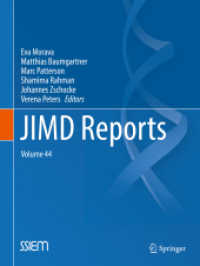- ホーム
- > 洋書
- > 英文書
- > History / World
Full Description
2018 Outstanding Academic Title, selected by Choice
Political Culture in Spanish America, 1500-1830 examines the nature of Spanish American political culture by reevaluating the political theory, institutions, and practices of the Hispanic world. Consisting of eight case studies with a focus on New Spain and Quito, Jaime E. RodrÍguez O. demonstrates that the process of independence of Spanish America differs from previous claims.
In 1188 King Alfonso IX convened the Cortes, the first congress in Europe that included the three estates: the clergy, the nobility, and the towns. This heritage, along with events in the sixteenth century, including the rebellion of Castilla and the Protestant Reformation, transformed the nature of Hispanic political thought. RodrÍguez O. argues that those developments, rather than the Enlightenment, were the basis of the Hispanic revolution and the Constitution of 1812. Emphasizing continuity rather than the rejection of Hispanic political culture, and including the Atlantic perspective, Political Culture in Spanish America, 1500-1830 demonstrates the nature of the Hispanic revolution and the process of independence. RodrÍguez O.'s work will encourage historians of Spanish America to reexamine the political institutions and processes of those nations from a broad perspective to gain a deeper understanding of the Spanish American countries that emerged from the breakup of the composite monarchy.
Contents
List of Tables
Preface
A Note on Usage
Introduction
1. The Nature of Representation in New Spain
2. The Origins of the Quito Revolution of 1809
3. Clerical Culture in the Kingdom of Quito
4. Citizens of the Spanish Nation
5. The Emancipation of America
6. U.S. Independence and Spanish American Independence
7. Caudillos and Historians
8. New Directions and Old Questions
Source Acknowledgments
Notes
Bibliography
Index






